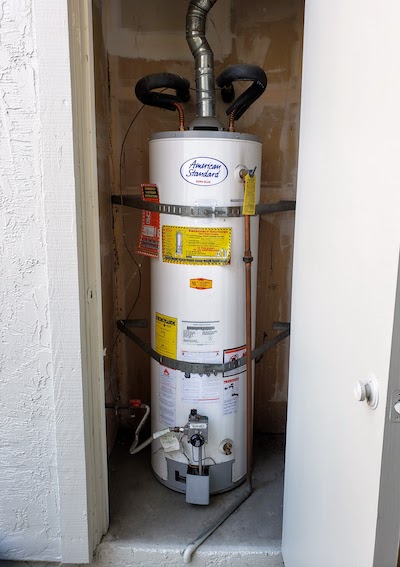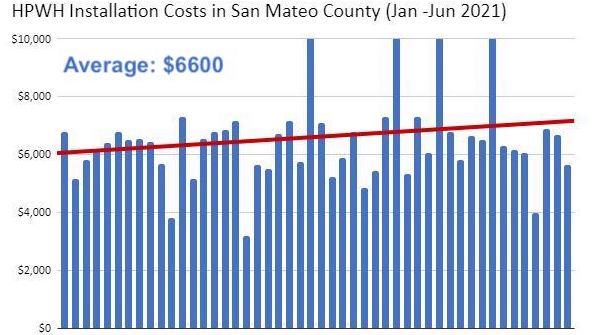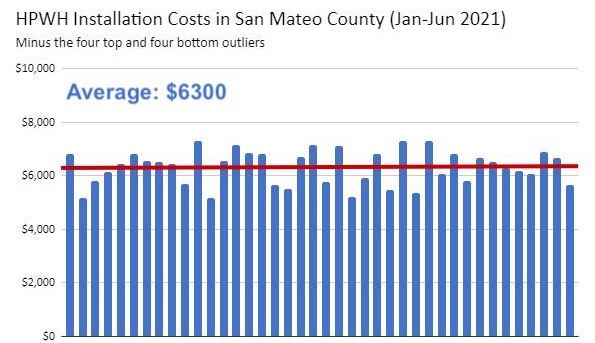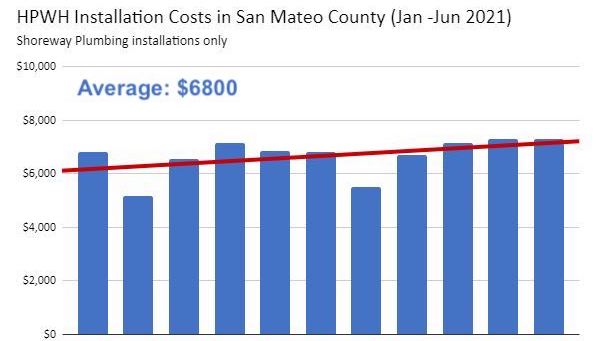My parents decided a few months ago to replace their aging gas water heater with a heat pump water heater since water heaters represent about one-third of our residential building emissions. They read my two blogs on the topic to learn more about their options. I was excited because they are in Peninsula Clean Energy’s territory, which meant they would get a whopping $2500 rebate (1) as long as they used a BayREN-approved contractor. There are plenty of them to choose from. Since my research had shown these installations in this area to cost “around” $4500-$5000, this could be done at a reasonable net cost.
My parents wanted a 65-gallon, 15-amp version, but the estimates ended up being for the 30-amp version since local plumbing supply stores do not stock the 15-amp heater. Fortunately, their electric panel has plenty of room. The water heater closet could fit the new HPWH, and any hum wouldn’t be a problem as the closet abuts the garage and a bathroom. The location is very convenient to an electric box, so the electric work would be minimal. I figured this would be a pretty straight-forward and low-cost swap.

My parents’ gas water heater in an outdoor closet by the garage
My parents got bids from three local contractors, each of whom came out to take a look. To my surprise, the estimates were all much higher than I anticipated:


I was flabbergasted, and disappointed. How can we get widespread adoption of heat pump water heaters if we have to pay this much for a vanilla installation? And yet we need to wean ourselves off of the fossil fuels whose combustion is making the planet increasingly uninhabitable. What is going on, and how do we fix it?
None of the estimates included a breakdown of materials and labor, so once my parents picked a contractor (they chose the third listed above), I asked them to track how much time was spent on the installation. I figure the materials were about $2500 for the tank, copper piping, and other items. If you assume a 20% markup ($3000 for materials), then the contractor was charging $4000 in labor for this water heater replacement. I asked my parents to keep track of how long they spent on the job and what they were doing. My mom reported that one guy was there for about 9 hours and another for about 7 hours. An electrician was there for 1-2 hours, and a supervisor was there for about 4 hours on and off. That is a total of 22 hours at $180/hour. With the level of experience you would expect for $180/hour, the 22 hours seems extremely high. For reference, a local who has installed many HPWHs says “I have never had one take more than about 8 hours to install, and usually I am working by myself with one trip to the store.”
Where did the time go? My parents said some of the time was spent modifying the piping to accommodate a change from the gas tank’s hookups (on top) to the HPWH hookups (on the side). That is typical for these installations. But much more time was spent getting the duct set up to bring air from the garage on the left to the intake on top of the heater. Running the heat pump using air from the garage saves energy if the closet air gets cool (from operating the heat pump). That can happen even with vents in the exterior wall, so the duct can be helpful. But setting one up should not be a showstopper in terms of labor and cost.
Here is what the new water heater looks like:

My parents’ new 65-gallon heat pump water heater
From what I can tell, they did a fine job. The work is neat, everything fits well, the tank orientation is good, the duct work is nice, and the hot water pipe is well insulated. (2) You can see in the top right that they put in an expansion tank, which is almost certainly unnecessary because the gas tank water heater didn't have one. (3) How much did that cost, and how long did it take to put up? They also neglected to check a few things. For example, the day after the installation my parents noticed that the display was so dim as to be unreadable. My parents were also not able to use the app, which allows you to do things like put the heater in vacation mode. It would have been good to check both of these things during the first visit. But generally it seems to be working fine.
The problem is the high cost. Bret Andersen of Carbon Free Palo Alto notes that the Sacramento Municipal Utility District has overseen more than 1500 HPWH installs and the cost is down to about $4000 on average. An experienced workman doing 8-hour installations at a wage of $150/hour, plus $2500 in materials and a 20% markup would charge $4200. Prices under $5000 are pretty common in Silicon Valley Clean Energy territory. So the $7000+ prices my parents were quoted are going to be a big stumbling block for the heat pump water heater adoption that we know we need.
Rafael Reyes, Director of Energy Programs for Peninsula Clean Energy, agrees. “Clearly there is an issue here. We’re at the beginning of the beginning, so it’s not surprising that prices are high but it’s frustrating and disappointing.” Reyes shared the installation cost data that they have to date, covering about fifty installations this year. The average cost is around $6600 (the costs shown do not include the occasional panel upgrade), and they actually got somewhat more expensive over the six months.

Earlier installations are shown on the left, later installations on the right.
If you remove the top four and bottom four outliers, the picture looks more uniform, but the average is still a high $6300 and not getting any cheaper as contractors gain experience.

It’s interesting to look at the two top installers, emeraldECO and Shoreway Plumbing. The price at emeraldECO has held fairly steady, averaging about $6100.

Shoreway Plumbing costs more (average price around $6800) and seems to be getting somewhat more expensive as time goes on. Why?

Both are still well above $4000-$5000 per install. Why are prices so high? Here are some thoughts.
1. Contractors are incorporating the rebate into their price. Plumbers that work in San Mateo County are well aware of the $2500 rebate to customers, so it may be that they are raising their prices to soak up some of the rebate. Customers should ask that estimates separate out materials and labor, to put some pressure on the contractor for a realistic estimate. Rebating organizations should also promote pricing transparency, as Silicon Valley Clean Energy does. Peninsula Clean Energy has just begun publishing costs now that they have enough installations. The organization certifying the contractors, BayREN, should stop promoting those that are consistently charging more than a “fair” price.
It has also been suggested, most recently by Berkeley economist James Sallee, that some or all of the rebate could go directly to contractors. That might help to get contractors more enthusiastic about installing these appliances and keep prices more stable and lower across the market.
2. The rebate program increases the cost of the installation. The rebate program requires a permit. Only about 10% of water heater installations in our area get a permit, so this is a cost that is not normally incurred. A permit costs $600 in Foster City, where my parents live, plus the cost of hours of labor spent waiting for the inspector to arrive. Inspections can also result in conservative and costly features like the expansion tank in this example. David Coale, a big supporter of HPWHs in Palo Alto, is frustrated that the permit fee in Palo Alto, plus additional contractor hours, eats up nearly all of the $1200 rebate the City offers. “The rebate money from the utility just goes to pay for the cost of permitting and inspection, which is required to get the rebate.” Summarized another HVAC contractor I spoke with: “It’s grift, pure and simple.” Bruce Hodge of Carbon Free Palo Alto would really like to see cities certify trained and fair-priced contractors who can then operate without permits, speeding up and lowering the cost of installations. (4)
3. Contractors don’t know heat pump water heaters. Plumbers and HVAC technicians have spent years learning how to install and maintain gas appliances, and they naturally prefer what they are familiar with. They may not trust heat pumps, or understand the electrical requirements, or be confident about answering questions and maintaining them. As a result, they may charge more to work with them. Reyes points out that we saw similar reluctance with EVs in the early days -- salesmen would actively try to talk you out of buying one. We need quality, low-cost training for tradesmen on heat pump water heaters. BayREN provides this, and Peninsula Clean Energy has had some success recruiting San Mateo County plumbers to their program.
4. Contractors don’t like heat pump water heaters. I have yet to speak to a contractor who loves heat pump water heaters, even when they are familiar with them. This is partly because HPWHs have no particular advantage over their gas counterparts when it comes to basic functionality. In contrast, consider mini splits. Contractors like to promote mini splits because they have several operational advantages over traditional air conditioners. They are much quieter and cheaper to operate, plus they do heating. It’s easy to sell these to their customers.
Heat pump water heaters are a different story. With our energy prices, they cost about the same to operate, though time-of-use rates can reduce those costs. The heat pumps are also less powerful than the gas versions. A heat pump water heater might take two hours to heat up a big tank of cold water, while a gas-powered one might take 45 minutes. Tanks do not empty often, and when they do two hours is usually a sufficiently fast refill interval. But some plumbers focus on the outlier cases. One that I spoke with described the “human car washes” (luxury bathrooms) that use inordinate amounts of hot water. He once had to install three heat pump water heaters in a high-end home to meet their water needs. His conclusion? “These appliances are not ready.”
But most of us don’t have homes or hot water demands like that. A 65- or even 80-gallon tank with a 2-hour refill time is more than enough for most households. Another contractor told me “I have installed a lot of 50-gallon heat pump water heaters and no one has run out of hot water.” Plumbers might be more confident recommending these if they understood the hot water needs of their customers. I wonder if our smart meters, with some intelligence, could provide information about when and how often the hot water heater is running. That would help contractors to confidently recommend a particular type and size of HPWH. But that brings me to …
5. The right heaters are not available. The heaters that people should be installing are (generally speaking) 15-amp heaters that are somewhat larger than the one they currently have installed. They will run efficiently and use less space in the electric panel without running short of hot water. However, the 15-amp heaters currently cost more and can require a long wait, plus stores tend to stock more of the smaller heaters. One option might be for local organizations to bulk purchase and store the larger 15-amp water heaters. Alternatively, customers can order them in advance. Installations cost less when materials are readily available at a good price.
6. Do contractor prices discriminate? My parents are seniors. Did the plumbers view them as an easy mark? Their gas water heater hadn’t broken yet. Did the workmen assume an eco-conscious consumer would pay whatever they asked? The published prices should help to reduce any predatory pricing (PCE and SVCE). “It is also essential that customers get multiple bids”, says Peninsula Clean Energy’s Reyes. (5)
If we are serious about reducing our building emissions -- and we should be -- then we have to quickly get to $4xxx prices for heat pump water heater installations in modest residences. We want our HVAC contractors and plumbers to feel confident about promoting these appliances. We want the right appliances to be available. We want faster installations. And the price must be right. How do we do this?
I asked Reyes whether, given the problems we are seeing, rebates are the right tool for juicing the HPWH market. “Well, there’s no perfect answer. An incentive is important to start the market. Educating contractors is also very important. We are partnering with BayREN for training and recommending contractors, and we recruited some local contractors to participate. An alternative would be what the Sacramento Municipal Utility District is doing, where the utility more directly manages the contractor base. There’s a lot involved in that, though, and we are still at the beginning.” He noted that Peninsula Clean Energy will be rolling out a zero-percent financing program for clean energy updates, up to $10,000 per household, which should help some families with the up front costs of electrification. They also continue to track and promote new technology that will bring costs down, such as the 120-volt HPWHs.
Will HPWH adoption mirror that of solar roofs and EVs? Those markets were primed with rebates and uptake grew quickly as prices came down and people gained confidence in the technology. Will the same happen with heat pumps? Reyes mulled it over. “Well, water heaters are in some ways more difficult than solar and EVs. Those benefited from a glamour factor, or at least a visibility factor. No one cares about or sees water heaters. In addition, buildings can be very different from one another, more so than roofs. So the economics of heat pump water heaters is harder. One thing that really helps is if these appliances run only when electricity is cheaper. We’ve seen people’s energy bills go down by about 25%. We’d really like to see that happening with electric heaters, and we are looking for technologies that support that.”
Peninsula Clean Energy is pursuing a number of angles to correct the HPWH market. Publishing the installation costs is a great step. I would also like to see BayREN paying more attention to the prices being charged and to stop promoting price gougers. I would like for city-certified installers to be allowed to bypass permits and fees, subject only to spot checks. I would like to see energy rates that boost the value of these appliances, so they are an easier sell. And I would like to see more competition in the market. SunWork’s imminent arrival in the area is going to be a big help, as will strong demand from residents working to reduce emissions.
Let’s do more to stop the price gouging. When you shop for a heat pump water heater, be informed, get several estimates, push back on high prices, and promote those contractors that provide good value. If you’ve got a heat pump water heater price story, please share it in the comments.
Notes and References
1. The Peninsula Clean Energy rebate will go down to $2000 after Sept 30.
2. An experienced installer noted a few possible improvements, such as the cold line having some insulation on the section near the tank.
3. An expansion tank is only required when a backflow preventer prohibits expansion elsewhere. This is not a common case and it applies regardless of the energy source for a water heater.
4. Hodge recommends this as part of a larger program that he refers to as “direct install” that would also include zero-interest on-bill financing.
5. Tom Kabat, an environmental commissioner for Menlo Park, recommends that potential customers take a photo or two of their gas tank, showing the top and bottom and location of all pipes, and send a note like this to three contractors: “I’m interested in replacing this working gas water heater with a 15-amp heat pump water heater the next size up in gallons. My main panel has space for the 240V 15-amp circuit and is 20 feet across the garage from the water heater. Please let me know if you are interested in making a bid under $4500. Thank you!”
6. If you have read this far and are interested in installing a heat pump water heater, I’d encourage you to get an estimate from Air & Plumbing Systems. They seem to have consistently fair rates and a lot of experience installing these appliances.
Current Climate Data (July 2021)
Global impacts, US impacts, CO2 metric, Climate dashboard (updated annually)
“Nearly 1 in 3 Americans live in a county hit by a weather disaster in the past three months, according to a new Washington Post analysis of federal disaster declarations…. The expanding reach of climate-fueled disasters, a trend that has been increasing at least since 2018, shows the extent to which a warming planet has already transformed Americans’ lives…. Americans’ growing sense of vulnerability is palpable. Craig Fugate, former head of the Federal Emergency Management Agency and Florida’s Emergency Management Division, has never known a summer as packed with crises as this one. The question, he wonders, is whether this calamitous season will mark a turning point in public opinion that finally forces political leaders to act. ‘If not,’ Fugate asked, ‘what will it take?’” Source: The Washington Post
Comment Guidelines
I hope that your contributions will be an important part of this blog. To keep the discussion productive, please adhere to these guidelines or your comment may be moderated:
- Avoid disrespectful, disparaging, snide, angry, or ad hominem comments.
- Stay fact-based and refer to reputable sources.
- Stay on topic.
- In general, maintain this as a welcoming space for all readers.
Comments that are written in batches by people/bots from far outside of this community are being removed.



